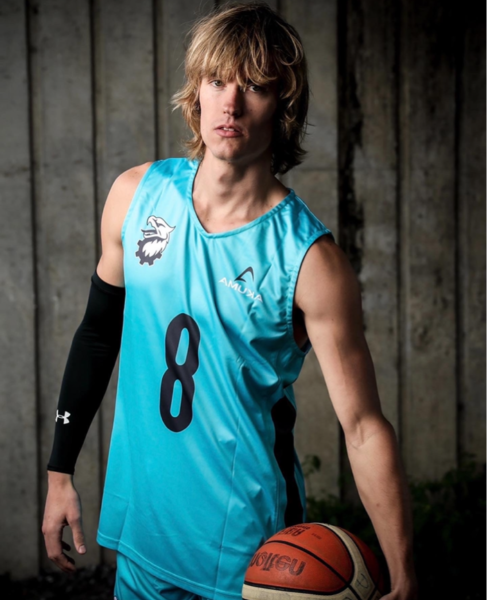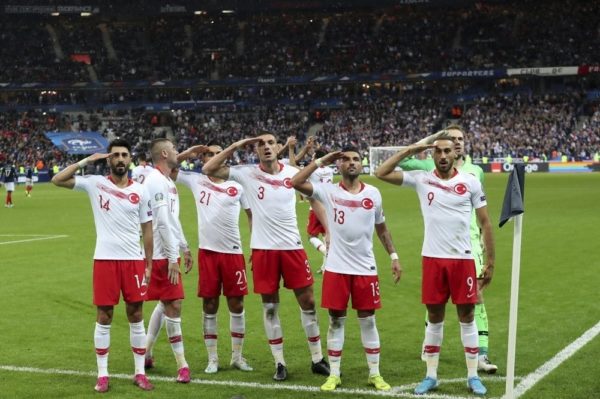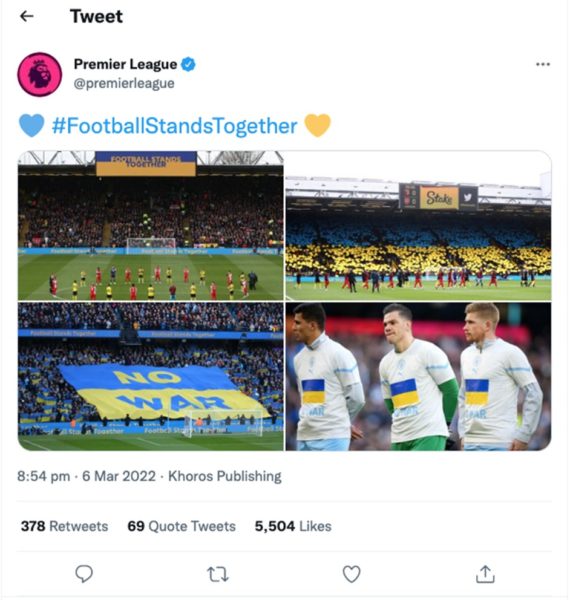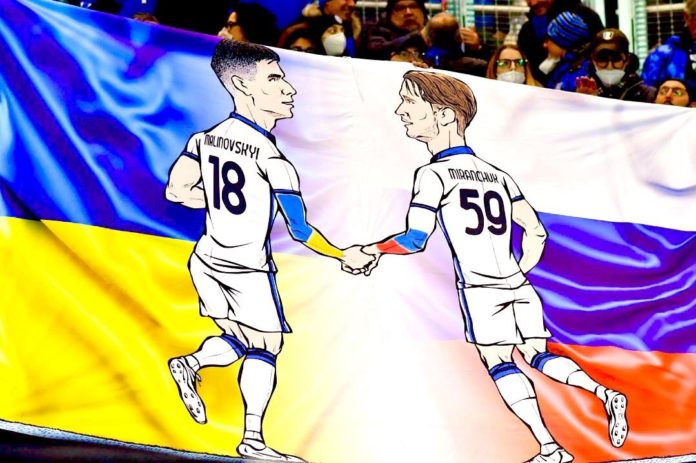In his first piece for Rising East, Andrea Zanetti investigates how fair it is to ban Russian athletes from competition
It is the 23rd minute during the first leg of the Europa League round of 16 match between Italian side Atalanta and German side Bayer Leverkusen: Atalanta are 1-0 down when Ukrainian midfielder Ruslan Malinovskyi equalises the score. But Malinovskyi’s face doesn’t burst out in joy and indeed, instead of his usual celebration, the 29-year-old raises his fists and points his fingers to the sky. Aleksey Miranchuk, Malinovskyi’s Russian teammate, on the bench that night, stands up to clap him. He has shiny eyes and looks visibly shaken. Meanwhile, a flag waves in the stands. It shows a caricature of Malinovskyi and Miranchuk holding each other’s hand and in the background the Ukrainian flag blends into the Russian one.
This is one of the last chances for Miranchuk, and all his fellow countrymen and women, to compete for an international tournament: in fact, Russian athletes have been progressively banned from sports competitions all around the world, after Russia has extended its invasion of Ukraine to a full-scale war.
Are Bans Fair?
If there’s no doubt at all to condemn this abhorrent military operation, it appears less clear why athletes should be excluded.
King Turnbull is the American star of the University of East London Men’s Basketball 2nd team and he’s eager to share his view as an athlete on this delicate matter. From his home in Houston, Texas, he wants to stress that “the Russian government is committing atrocities and I completely disagree with their invasion.”
King recognizes the complexity of the situation: “I understand that the world doesn’t want the Russian symbols affiliated with their competitions, for political and economic reasons too, and, personally, I would not be ok with their symbols and their flag because it would send the wrong message to the world”.

Unsurprisingly, it is known how the Russian government exploits sports triumphs in its own favour to justify unpopular or even violent actions. A glaring example of Russian sports-washing dates back to 2014, when Vladimir Putin started the invasion of Ukraine after he had been able to increase his approval rating through the success achieved by Russian athletes at the Winter Olympic Games hosted in Sochi.
However, King believes that sports and politics should always be kept separate, “because these athletes don’t have any control over the actions of their government”. He says: “I think the Russian athletes should be able to compete under their name. They were allowed to compete under their name after the doping scandal, when the athletes had a real advantage and they were aware of it. But now they have done absolutely nothing wrong, that’s the main difference.”
Hypocrisy
In 2017, following the revelations of two whistle-blowers, it was found that most of the Russian athletes took part in a doping scheme sponsored by the Government, in order to elude anti-doping tests in international competitions such as the Olympic Games, and that this scheme had been going on for decades. But despite the overwhelming evidence of a dishonest system promoted by the Government which undermined one of the constitutive principles of sports, only the Russian Olympic Committee was disqualified, therefore allowing the athletes to take part neutrally, without flags or symbols.
“There’s definitely hypocrisy from the people in place that are allowing who gets to join these competitions. Russians can’t join because they’re involved in an invasion. But there are many countries who are at war right now, the media just don’t talk about it”, explains Turnbull. Indeed, the governing bodies of various sports associations all around the world haven’t always behaved ethically: Turkey didn’t face any consequences after their invasion of Syria in 2019; nothing was done to punish the first invasion of Ukraine by Russia in 2014; Saudi Arabia continues its military intervention in Yemen while they enter the Western sports universe through multi-billion-pound deals.

“I Would Just Be Absolutely Devastated”
Nevertheless, when asked what his reaction would be if a similar situation happened to him, he doesn’t even let me finish the question: “I would just be absolutely devastated thinking that everything I’d been working for has gone to waste. Most of the time you spend your training on your own and then you get one 2-hour game a week, or one time every four years like for the Olympics, to showcase your work. They work their entire life for this”.
Back in March, Sports Minister Nigel Huddleston suggested to the various governing bodies to uplift the ban of individual Russian and Belarussian sports people only after a written declaration by these athletes, assuring they are independent, neutral, and they don’t receive money from Putin nor don’t support him.
Danger Of Speaking Out
“I think it is a decision that each of these athletes has to really think about”, King believes.
“For example, I come from the US where I can say whatever I want freely, and I get praised too from a lot of people, even if I attack the government. Now, in Russia where the media are controlled by the State, if you speak against your country not only do you put yourself in jeopardy, but your family too”.
What King denounces is sadly well-known. The list of Russian figures dissident to the regime murdered or found dead in murky circumstances is long, and sports are not exempt from this shame. Grigory Rodchenkov, the former head of Russia’s Anti-Doping Centre who made public the State-sponsored doping scheme mentioned previously is the most recent case: after he’d fled from Russia to avoid becoming the scapegoat, his personal assets were frozen, and his family’s passports confiscated while two of his former colleagues were found dead. Consequently, the growing concerns about his safety forced the American authorities to let him into the Witness Protection Programme.
King insists that “this is what a lot of people have to realise: a lot of these Russian athletes have the same sentiments that people around the world have, but the consequences if they speak up against their country are much higher”. Tragically, this is the same concept expressed by Anna Politkovskaya in her book ‘Putin’s Russia’, an account about life in modern Russia in which she harshly criticises Putin’s government. She remarked fiercely the idea that not all Russian citizens praised their leader, that they don’t want to be slaves and demand the right to be free. Her ideas led to her brutal homicide.

Finally, asked if he would speak up against the war himself, King reflects that “I want to say that I would, just because I was raised to stand up for what’s right, but I understand why these people don’t do it” and voices his inner hopes that eventually “if you have one person that does [speak up], it would be a domino effect and then more will do it. Or if they joined forces together, a lot of different athletes came out together and spoke about it, that would be the most effective piece of action. I hope they do it”.
Sport has always been a vehicle of inclusivity and equality, with definite rules but no clear boundaries. Sport cannot stop a war, but can promote brotherhood among human beings. The people responsible for this carnage must face the severe consequences of their actions, while leaving the space to the athletes to raise awareness on historical mistakes. Together, as King ardently highlights.

